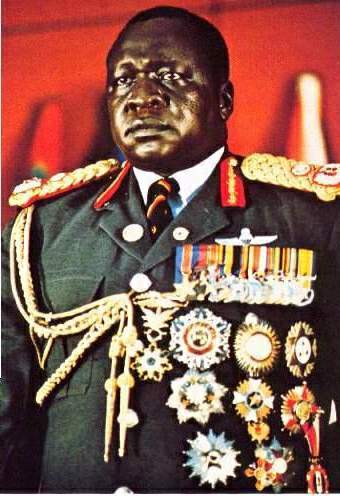Word of the Day
Idi (EE-dee)
· Common clues: Infamous Amin
· Crossword puzzle frequency: 6 times a year
· Frequency in English language: 46889 / 86800
Idi Amin Dada Oumee (May 17, 1928 – August 16, 2003) was the military dictator of Uganda from January 25, 1971, to April 11, 1979.
Amin took tribalism, a long-standing problem in Uganda, to its extreme by ordering the persecution of Acholi, Lango, and other tribes. Reports of the torture and murder of 300,000 to 500,000 Ugandans during Amin's presidency have been widespread since the 1970s.

Early career
Amin joined the King's African Rifles of the British colonial army as a private in 1946, rising to the rank of lieutenant after seeing action during the Mau Mau revolt in Kenya. He was considered a skilled, but somewhat overeager, soldier, and developed a reputation for cruelty. He rose through the ranks, reaching sergeant-major before being made an effendi, the highest rank possible for a Black African in the British army. Amin was also an accomplished sportsman, besides being a champion swimmer he held Uganda's light heavyweight boxing championship from 1951 to 1960.
After independence in October 1962, Milton Obote, Uganda's first prime minister, rewarded his loyalty by promoting him to captain in 1963 and deputy commander of the army in 1964. In 1965 Obote and Amin were implicated in a deal to smuggle gold, coffee, and ivory out of the Democratic Republic of the Congo.
Amin began recruiting members of his own tribe into the army as well as many Muslims from his West Nile area to the northwest of Uganda near the Sudan border. Relations with Obote began to sour. Obote first responded by putting Amin under house arrest, and when this failed, Amin was given a non-executive position in the army.
After hearing that Obote was planning to arrest him for misappropriating army funds, he seized power in a coup on January 25, 1971, when Obote was attending a Commonwealth summit meeting in Singapore. He was assisted by Rwandan exiles, whom Obote had targeted as enemies. Obote stayed in exile, and Amin declared himself the new President.
Idi Amin was initially welcomed both within Uganda and by the international community. He gave King Freddie (who had died in exile) a state burial in April 1971, freed many political prisoners, and disbanded the Secret Police, the General Service Unit. He promised to hold elections within months. Many foreign journalists considered him a somewhat comical and eccentric figure. He was fond of racing cars (of which he owned several), boxing, and Disney cartoons.
His light-hearted and often childish public persona hid an inner brutality, however. Shortly after taking power Amin established "killer squads" to hunt down and murder Obote's supporters as well as much of the intelligentsia, whom he distrusted. Military leaders who had not supported the coup were executed, many by beheading.
Amin had strong links to the Palestine Liberation Organization (PLO). The Israeli embassy was offered to them as headquarters; and Flight 139, the Air France A-300B Airbus hijacked from Athens on the 27th June 1976, was invited by Amin to stop at Entebbe International Airport in Entebbe town, 32 km away from Kampala. The hijackers demanded the release of 53 PLO prisoners in return for the 256 hostages, and were assisted by Amin's troops. Amin visited the hostages more than once. On July 3, 1976, Israeli paratroopers attacked the airport and freed all of the hostages but one 75 year old woman, Dora Bloch, who had been taken to a hospital before the rescue. Uganda's air force was badly crippled as its fighter jets were destroyed in the action.
As the years went on, Amin became increasingly erratic and outspoken.
In October 1978 Amin ordered the invasion of Tanzania while at the same time attempting to cover up an army mutiny. With help of Libyan troops, Amin tried to annex Kagera, the northern province of Tanzania. The Tanzanian armed forces fought back, enlisting Ugandan exiles who had fled into Tanzania. By April 1979 Tanzania, under president Julius Nyerere, had driven out Amin, taking the Ugandan capital Kampala with the help of the Ugandan and Rwandan guerrillas.
Exile
Amin fled to exile, first in Libya, where sources are divided on whether he remained until December 1979, or 1980, before finding final asylum in Saudi Arabia. He opened a bank account in Jeddah in 1979, and resided there, subsisting on a government stipend. The new Ugandan government chose to keep him exiled, saying that Amin would face war crimes charges if he ever returned.
On July 20, 2003, one of his wives, Madina, reported that he was near death in a coma at the King Faisal specialist hospital in Jeddah. She pleaded with Uganda's president Yoweri Museveni that he might return to die in Uganda. The reply was that if he returned, he would have to "answer for his sins". Idi Amin died in Saudi Arabia on August 16, 2003, and was buried in Jeddah.
This article is licensed under the GNU Free Documentation License. It uses material from the Wikipedia article "Idi Amin".
|
|